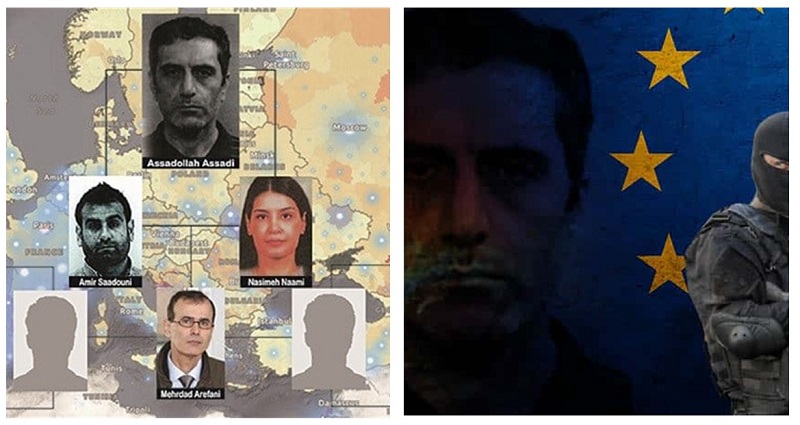
In an attempt to escape accountability for the plot to bomb the Iranian Resistance rally in France in 2018, three of the four co-conspirators set out to appeal their convictions last week at a court in Belgium.
Iranian/Belgian Dual Citizenship holders Amir Saadouni, Nasimeh Naami and Mehrdad Arefani were each sentenced to between 15 and 20 years in prison for their roles in the plot to detonate a deadly triacetone triperoxide (TATP) bomb at the rally.
Colonel (Retired) Wes Martin wrote on the National Council of Resistance of Iran (NCRI) website, “Their defenses are basically built around claims of not knowing what they were carrying when passing through the Belgian security checkpoint on their way into France.”
However, their claims are far from the truth. They were working for the Iranian regime’s Ministry of Intelligence and Security (MOIS) and were provided a package including all of the bomb components by the mastermind of the plot. They were also instructed where to take it, how to put the components together, and how to covertly transfer it to the detonation location.
While the three men are awaiting the outcome of their appeals, they are also challenging the decision to revoke the European portion of their dual citizenship as they fear being sent back to Iran. Especially as the regime is known to not deal too kindly with former agents who failed their missions.
The fourth co-conspirator of the bomb plot, who is in fact the mastermind behind the failed terrorist operation, is Assadollah Assadi. He chose not to appeal his conviction, instead hoping that his former diplomatic status as the third-ranking member and security chief of the Iranian Embassy in Austria would save him from facing the consequences of his actions. He was the one who transported the explosives from Tehran within his diplomatic pouch to bypass security checks, and then once in Europe he delivered the device to his agents and issued their orders.
Wes Martin wrote, “As subsequent investigations would reveal, Assadi traveled all over the continent linking up and coordinating with multiple sleeper cells. Assadi’s own failure to practice effective information-operations procedures, including operations security and electronic communications security, created red flags for Europe’s law enforcement and antiterrorism communities.”
Saadouni, Naami and Arefani were stopped by Belgian police as they attempted to cross in to France, while Assadi was apprehended by German police as he attempted to get back to the safety of the embassy in Austria.
Upon searching Assadi’s vehicle, German authorities discovered a green notebook which exposed the extent of the regime’s terrorist network in Europe, detailing meeting locations, agents working within the network, and the amount of money they had been paid for missions.
Mr. Martin wrote, “For not appealing his conviction and sentence, Assadi could claim loyalty to Tehran. This claim would include not wanting to bring more attention to the MOIS and Islamic Republican Guard Corps (IRGC) who likely manufactured to TATP explosive device that Assadi brought back from Tehran. The reality is likely less noble.”
The Belgian court is likely to quash the appeals and remain firm with the sentences that the four men were given earlier this year. The capture of this particular terrorist cell has confirmed that European law enforcement agencies are more than capable of dealing with terrorism. The next step would be to take down the entire network across Europe, but without the cooperation from all Western governments, this will be tough.
There is enough critical information in Assadi’s notebook for government heads to identify and deport sleeper agents across Europe back to Iran, and now is the time for them to also declare the MOIS as a terrorist organization.
The lack of action by western politicians, who seem content with the cloak of diplomacy, has led the Iranian regime to perceive this as a weakness that they are determined to exploit to undermine international peace.
Colonel Martin wrote, “As long as these three terrorists are held accountable for their actions, the ruling extremists in Iran will be forced to understand there are some western government agencies not willing to ignore the rule of law.”
Colonel Wes Martin served as the first senior anti-terrorism officer for all coalition forces in Iraq.